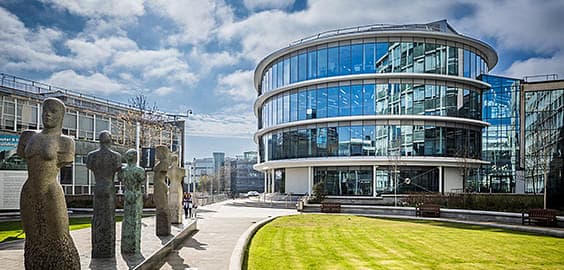The Sport Exercise and Nutrition course shares common modules that have been developed for the whole of Sport, Exercise and Rehabilitation to encourage multidisciplinary collaboration between students across sport science, sport and exercise nutrition, sport coaching, sport management and physiotherapy. Additional modules on the course will allow you to broaden your horizons and learn from your peers in other areas.
You'll learn through a wide range of methods including lectures, presentations by visiting professionals, seminars, laboratory sessions and workshops – all supported by an e-Learning platform (eLP) and other technology.
Lectures will provide a conceptual framework and draw attention to important and controversial issues, whilst seminars, laboratory sessions and workshops will offer a range of activities from experiments to the critique of case study scenarios.
You will have the opportunity to do a variety of add on courses, which may have an additional cost. These might include 'working with people who have disabilities', 'working with children', 'first aid', 'ISAK Level 1/2 Body Composition Analysis' and more to enhance your employability prospects and graduate readiness upon completion of the Sport, Exercise and Nutrition Course.
Assignments are designed to reflect the modern multi-cultural world and ethical considerations including sustainability, and therefore you will be encouraged to develop an understanding of, and respect for, the diverse needs of participants and clients from different clinical groups and cultural backgrounds, whilst recognisnng the need for sustainable interventions (i.e. plant-based diets, digitical campaigns and home-based intervention programmes).
Furthermore, assessments are student-centred, and many of the methods of assessments have an element of choice which will enable you to pursue issues and research questions of personal interest, giving you the opportunity to be creative and demonstrate individual passion, and to pursue your own vocationally relevant interests.
Example assessments include reporting on scientific data, providing feedback to clients, case conference and individual presentations, written exams and practical exams, sometimes in 'real-world' settings depending on the population of interest, such as primary school settings.
The programme has an ‘applied’ focus recognising the need for sport and exercise scientists to work in a multi and inter-disciplinary manner and therefore these traits are reflected in the real world nature of many of the assessments on the modules.
100% of students said the course has challenged them to achieve their best work (National Student Survey, 2020)
Modules
Module information is indicative and is reviewed annually therefore may be subject to change. Applicants will be informed if there are any changes.
Year one
- JG5001 -Academic Language Skills for Sport Exercise and Rehabilitation (Core – for International and EU students only,0 Credits)
- SP4000 -Academic and Professional Skills (Core,20 Credits)
- SP4001 -Fundamentals of Psychology (Core,20 Credits)
- SP4002 -Energetics of Exercise (Core,20 Credits)
- SP4003 -Introduction to Research (Core,20 Credits)
- SP4004 -Fundamentals of Anatomy and Biomechanics (Core,20 Credits)
- SP4005 -Fundamentals of Human Physiology (Core,20 Credits)
Year two
- JG5001 -Academic Language Skills for Sport Exercise and Rehabilitation (Core – for International and EU students only,0 Credits)
- SP5025 -Sport Study Abroad (60 credit) (Optional,60 Credits)
- SP5026 -Research Design and Analysis (Core,20 Credits)
- SP5027 -Sport Performance Assessment (Optional,20 Credits)
- SP5028 -Exercise and Health Assessment (Optional,20 Credits)
- SP5029 -SER Professional Development and Practice (Core,20 Credits)
- SP5030 -Extreme Physiology (Optional,20 Credits)
- SP5031 -Introduction to Performance Analysis (Optional,20 Credits)
- SP5032 -Applied Sport and Exercise Nutrition (Core,20 Credits)
- SP5033 -Contemporary Issues in PE and School Sport (PESS) (Optional,20 Credits)
- SP5034 -Principles of Strength and Conditioning (Optional,20 Credits)
- SP5035 -Physical Activity & Health (Optional,20 Credits)
- SP5036 -Managing & Developing the Business of Sport (Optional,20 Credits)
- SP5037 -Digital Sport & Business Marketing (Optional,20 Credits)
- SP5038 -Analytics for Sport (Optional,20 Credits)
- SP5042 -Nutrition for Health (Core,20 Credits)
Year three
- AT5004 -Year in International Business (This is made up of modules studied in Newcastle (Semester 1) & Amsterdam (Semester 2) (Optional,120 Credits)
- SP5024 -Sport Study Abroad Year (Optional,120 Credits)
- SP5043 -Sport, Exercise and Rehabilitation Work Placement Year (Optional,120 Credits)
Year four
- JG5001 -Academic Language Skills for Sport Exercise and Rehabilitation (Core – for International and EU students only,0 Credits)
- ML6001 -Unilang - Languages for All - Level 6 Placeholder (Optional,20 Credits)
- SP6035 -SER UG Project (Core,40 Credits)
- SP6036 -Sport Performance Intervention Strategies (Optional,20 Credits)
- SP6037 -Exercise & Health Intervention Strategies (Optional,20 Credits)
- SP6038 -Human Movement Science (Optional,20 Credits)
- SP6039 -Paediatric Sport and Exercise Science (Optional,20 Credits)
- SP6040 -Physiological basis of training and performance (Optional,20 Credits)
- SP6041 -Psychological Skills Training (Optional,20 Credits)
- SP6042 -Sports and Exercise Medicine, Injury and Rehabilitation (Optional,20 Credits)
- SP6043 -Talent Identification and High-Performance Sport (Optional,20 Credits)
- SP6044 -Sport Event Management (Optional,20 Credits)
- SP6045 -Applied Coaching of Individual Sports in an Educational Setting (Optional,20 Credits)
- SP6046 -Global Sport Business and Management (Optional,20 Credits)
- SP6047 -SER Professional & Career Development (Optional,20 Credits)
- SP6048 -Health, Exercise and Behaviour Change (Optional,20 Credits)
- SP6050 -Contemporary Issues in Sport and Exercise Nutrition (Core,20 Credits)
